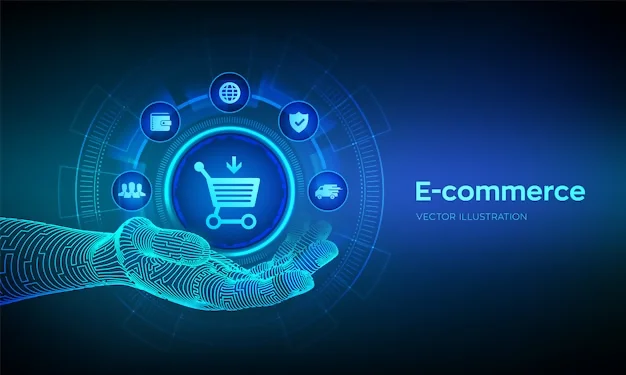E-commerce has transformed the way we shop, making products and services more accessible than ever. From small businesses to global giants, online shopping is now an essential part of our lives. But what lies ahead? The future of e-commerce is set to be more dynamic, innovative, and customer-centric, driven by advancements in technology and changing consumer behavior.

The Evolution of E-Commerce
Over the past two decades, e-commerce has evolved from a simple online transaction model to an AI-powered, data-driven ecosystem. The rise of mobile commerce, social shopping, and personalized experiences has reshaped how businesses interact with customers. In the future of e-commerce, technology will play an even more significant role in enhancing user experience, streamlining operations, and ensuring security.
Key Trends Shaping the Future of E-Commerce
1. Artificial Intelligence and Personalization
AI and machine learning are revolutionizing the future of e-commerce by offering personalized shopping experiences. AI-driven recommendations, chatbots, and virtual assistants help customers find what they need quickly and efficiently. Businesses that integrate AI into their e-commerce platforms will gain a competitive edge by delivering better user experiences.
2. Augmented Reality (AR) and Virtual Reality (VR)
One of the biggest challenges in online shopping is the inability to see, touch, or try products before purchasing. AR and VR are bridging this gap by allowing customers to visualize products in real-world settings. The future of e-commerce will see increased adoption of these technologies, making online shopping more immersive and interactive.
3. Voice Commerce
With the growing popularity of voice assistants like Alexa, Siri, and Google Assistant, voice commerce is gaining traction. Consumers are now using voice commands to search for products, place orders, and track shipments. The future of e-commerce will witness a surge in voice-enabled shopping, making the buying process even more seamless.
4. Blockchain for Secure Transactions
Security remains a top priority in online shopping. Blockchain technology is poised to revolutionize e-commerce by offering secure, transparent, and tamper-proof transactions. From supply chain management to fraud prevention, blockchain will be a key player in the future of e-commerce.
5. Social Commerce
Social media platforms are no longer just for connecting with friends. With the rise of social commerce, platforms like Instagram, Facebook, and TikTok are becoming shopping destinations. Brands are leveraging influencers and live shopping events to drive sales. The future of e-commerce will see an even tighter integration between social media and online shopping.
6. Sustainability and Ethical Shopping
Consumers are becoming more conscious of their purchases, favoring brands that prioritize sustainability and ethical sourcing. E-commerce companies are adopting eco-friendly packaging, reducing carbon footprints, and promoting fair trade. The future of e-commerce will be shaped by brands that align with customer values and sustainability efforts.
7. Subscription-Based Models
Subscription-based shopping is gaining popularity, offering convenience and cost savings. Whether it’s beauty boxes, meal kits, or streaming services, subscription models ensure a steady revenue stream for businesses. The future of e-commerce will see further expansion of this model across various industries.
8. Same-Day and Drone Deliveries
Fast and efficient delivery is a crucial factor in online shopping. With advancements in logistics, the future of e-commerce will see a rise in same-day deliveries and drone-based shipping solutions. Companies like Amazon are already testing drone deliveries to make shipping faster and more efficient.
Challenges in the Future of E-Commerce
Despite its rapid growth, e-commerce faces several challenges. Cybersecurity threats, data privacy concerns, and intense competition pose significant hurdles. Additionally, businesses must navigate evolving regulations and changing consumer expectations. To thrive in the future of e-commerce, companies must focus on innovation, security, and customer trust.
Conclusion
The future of e-commerce is full of possibilities. With AI-driven personalization, AR/VR shopping experiences, blockchain security, and sustainability initiatives, the industry is set to reach new heights. Businesses that embrace these trends and adapt to changing consumer demands will thrive in this ever-evolving digital landscape.
FAQs
1. What is the future of e-commerce?
The future of e-commerce will be shaped by AI, AR/VR, blockchain security, voice commerce, and sustainable shopping trends.
2. How will AI impact the future of e-commerce?
AI will enhance personalization, improve customer service through chatbots, and optimize inventory management, making online shopping more efficient.
3. Will physical stores disappear in the future of e-commerce?
While online shopping continues to grow, physical stores will likely evolve into hybrid models, combining in-store experiences with digital convenience.
4. Is social commerce the future of e-commerce?
Yes, social commerce is expected to play a significant role in e-commerce, as brands leverage social media platforms for direct shopping experiences.
5. How will blockchain improve the future of e-commerce?
Blockchain will enhance security, prevent fraud, and improve supply chain transparency, making online transactions more trustworthy.
The digital world is evolving, and so is online shopping. The future of e-commerce promises exciting advancements that will reshape how we buy and sell in the years to come.




